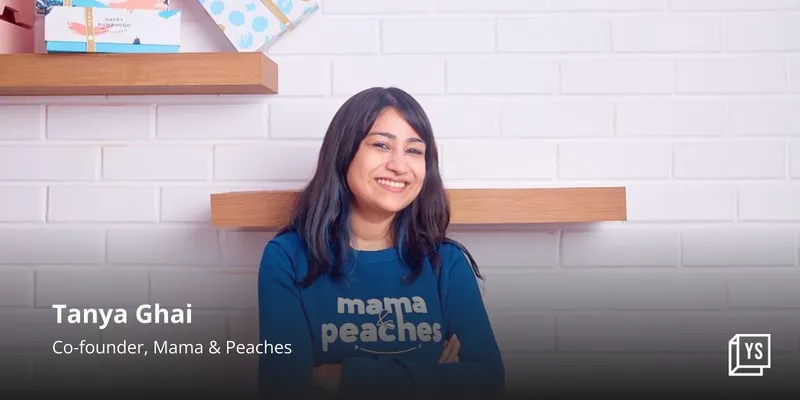Mama & Peaches aims to provide safe and ecofriendly products for moms and babies
Started by husband-wife duo Varun and Tanya Ghai, Delhi-based D2C startup Mama & Peaches offers over 7,500 SKUs priced between Rs 199 and Rs 1 lakh.
was born in 2017 as a subscription box company for expecting and new mothers. The luxury boxes became very popular, but the model was not scalable and the company couldn’t go beyond 1,000 subscribers a month.
The founders, husband-wife duo Varun and Tanya Ghai, were looking for options to survive and thrive. The duo knew from personal experience that shopping as a new parent was “not easy”.
“Having put in countless hours to procure the best products for my baby, I identified a gap in the market— parents were dependent on international brands and family living abroad or buying from unorganised channels. We set out on a mission to create, procure and gather the best product mix for them and have not looked back,” says Tanya, Co-founder of Mama & Peaches.

Mama & Peaches pivoted to an ecommerce vertical in April 2019.
The Delhi-based startup is an online platform that helps parents discover safe, environment friendly, and quality mom and baby products. Started with 10 products, the platform now offers over 7,500 SKUs priced between Rs 199 and Rs 1 lakh. These products are either curated from other brands or manufactured by the startup.
“We have a very stringent and strict process of listing and releasing products. I cannot offer anything to customers that I wouldn't buy as a mother myself,” says Tanya.
Varun and Tanya are both Delhi University graduates. Prior to Mama & Peaches, Tanya worked as an M&A associate at Eternus Capital while Varun handled a family clothing manufacturing business with a 1,000+ workforce and an annual turnover of Rs 300 crore.
Varun says the startup goes in for testing, countless tryouts, and customer feedback before launching any product.
“All 100% of our sales come from our online platform. We have recently added to our revenue stream by opening an experience studio in Hauz Khas and are venturing into omnichannel retail,” he adds.
The startup’s design team creates every product in-house, from inception to production.
“We deal with third-party vendors/factories for manufacturing and often supply fabrics and specs as per our requirement. Our merchandise and design team helps procure raw materials from across the country (we do not import anything as of now). We are currently working with 10-15 factories across different product categories,” Tanya says.
Products manufactured by the startup are sold under the label Mama & Peaches and Bam Bam Boo (private label).
Mama & Peaches also resells other D2C brands such as Joie baby, Nuna, Mustela, and Boingg on its platform and calls itself a “hybrid platform”.
“Our onboarding of brands on the platform is very selective, well researched, and curated, based on our vision of offering safe and quality verified products. This is what our customers expect as we are one of the trusted brands in this space,” Tanya says.
As a hybrid platform, Mama & Peaches houses over 50+ premium D2C brands.
”Clothing is our forte and currently brings in 30% of our revenue . About 30% of our revenue is in-house products and we intend to scale this to 65-70% in phase 2,” she says.
The startup has a team of eight-plus employees at present.
The USP
Varun says the “ethos of design, selection and curation of products” sets Mama & Peaches apart.
“This space is highly crowded and most platforms offer a cluttered experience. They focus on the ‘more principle’ and are largely deals/offers-oriented. We believe that shopping for little ones should be uncluttered, rewarding, and an exciting experience,” he says.

The brand is targeting parents of a modern India who believe in less is more and want a platform they can trust with their most important purchases.
“We help them navigate this new journey as a parent. This trust and brand loyalty is our cornerstone,” Varun says.
Funding and monetisation
Started with personal savings of Rs 15 lakh, the startup in 2021 raised an undisclosed amount from angel investors.
It is now actively looking to raise fresh capital and is in talks with various angels and funds. “We are looking to raise Rs 3.5 crore to Rs 4 crore and wish to deploy it in product development, tech enhancement, and experiential retailing,” Tanya says.
Mama & Peaches completed 30,000 orders across India by the end of August 2022. It generated a revenue of Rs 25 lakh for FY19, Rs 60 lakh for FY20, Rs 1.5 crore for FY21, and Rs 2.5 crore for FY22.
“Gross sales for the last six months are at Rs 2.25 crore, with an average growth rate of 8-10% MoM. We are on track to close the current financial year at over Rs 5 crore in annual sales,” Tanya says.
Way ahead
The childcare products market in India, specifically the mother and baby care market, is predicted to increase by $26.35 billion, at a CAGR of 11% during the time period 2020-2025, according to a report by Technavio.
“We are focused on capturing a large percentage of our niche. Given that new-age India parents think differently, we see a massive opportunity in this space of newborn shopping and gifting. We are looking to improve and innovate within our domain and provide our customers a world-class shopping experience,” Varun says.
Going forward, the startup, which competes with the likes of Nestery and FirstCry, plans to expand its online presence by partnering with relevant third-party marketplaces (such as Myntra).
“We intend to aggressively venture into omnichannel retail by exploring experiential retail opportunities, specifically in Delhi, Mumbai, and Bengaluru. We also intend to increase our product width and enter newer categories,” Varun says.
“Our revenue goal for FY24 (looking at market trends and current growth) is Rs 15 crore,” the founder says.
Edited by Teja Lele







